Science advances not as much from the work of individuals as it does from collaboration. Isaac Newton once said, in homage to his antecedents, "If I see further, it is by standing on the shoulders of giants".
Democritus

(Public Domain picture)
Democritus (460-370 BC) is considered to be one of the first 'atomists'. He postulated the existence of a basic unit of matter, and called it 'atomos'. Many centuries later, in the nineteenth century, John Dalton, (the "Father of Chemistry",) proposed a remarkably similar concept of the atom--and he used the word 'atom' to describe what he envisioned.
And yet, despite the presumed collegiality between scientists, there have been squabbles--downright feuds--throughout history about sharing information and receiving credit for breakthroughs. These disagreements have stained the records of more than one luminary. What are the rules of scholarship in science? How does one share and not encroach?
Louis Pasteur, and the Hunger for Recognition
Louis Pasteur
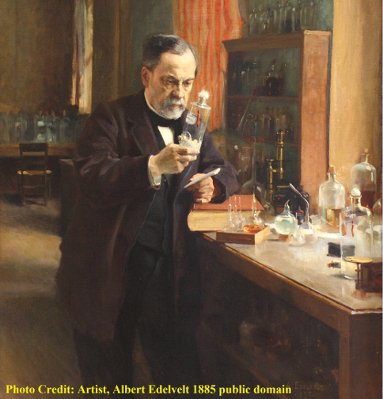
Public domain picture
Louis Pasteur's name is probably one of the most recognizable in science. We're all familiar with Pasteurization. The rabies and anthrax vaccines--these are both credited to Pasteur. However, there seems to be another, less well-known side to this scientist's biography.
In 1995 a Princeton University professor, Dr. Gerald I. Geison, published a book in which he described Pasteur as having a less than collegial approach toward scholarship. According to Geison, when Pasteur claimed credit for developing the anthrax vaccine, he was actually appropriating the research of a competitor, Jean-Joseph Toussaint.
Pasteur, Shown with a Rabid Dog and a Vial of Rabies Vaccine
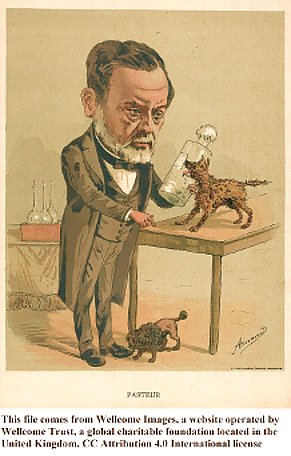
This file comes from Wellcome Images, a website operated by Wellcome Trust, a global charitable foundation based in the United Kingdom. Used under a CC 4.0 International license
One of Pasteur's more discrediting rushes toward fame was his use of the rabies vaccine on nine-year-old Joseph Meister. Joseph had been bitten by a rabid dog. The parents begged Pasteur to use the vaccine, as yet untested on humans. Pasteur assured them that the vaccine he was about to use had been tested on many dogs. He lied. His notes reveal that a similar vaccine had been tested but not the one he used on Joseph. Everything worked out fine, but Joseph Meister and his parents were unwitting allies in Pasteur's ambition to be first.
In The Subjectivity of Scientists and the Beysian Approach, authors James Press and Judith Tenur, explain that Pasteur wanted to be credited with priority in his work. In the science community, priority means being first. It means that the scientist has made an original, unique contribution. Being first means that a scientist will be mentioned in history books, and will win prizes.
Discovering the Structure of DNA
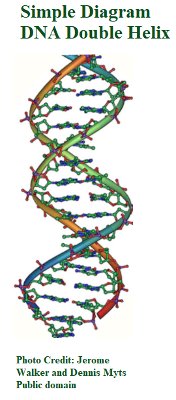
The issue of priority was at the heart of one of the most consequential scientific advances of the twentieth century: the 'discovery' of the double helix, the structure of DNA. History shows that one photo provided the final key to unraveling the secret of DNA's structure. Who took that photo? Who owned the rights to that picture? How did Watson and Crick--credited with unraveling the secret of DNA's structure--get their hands on this very consequential photo? Who ultimately deserved credit for being 'first'?
Before this historic photo was produced, theories about the possible structure of DNA abounded. Several researchers were exquisitely close to solving the puzzle. The image in the photo--characterized ever after as Photo 51--was captured by using highly specialized technology, x-ray crystallography.
A review of the drama surrounding Photo 51 offers some insight into the issues of priority, attribution, and shared knowledge.
Photo 51
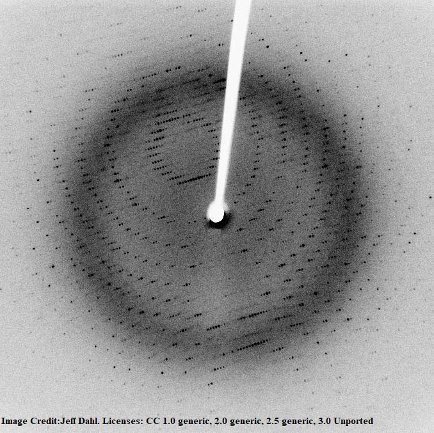
Credit Jeff Dahl. CC 3.0 Unported license
This is actually not Photo 51, but the image does show the kind of impression that can be captured through x-ray crystallography. What this picture shows is the x-ray diffraction pattern of a SARS enzyme. I cannot show you the original Photo 51 here because it is copyright protected. However, follow this link and you can view the famous photo.
The story of Photo 51 illustrates the tension that can and does arise between scientists sometimes in the race to achieve priority.
The Drama
The setting for the drama was England, in two research centers: Kings College and Cambridge University. The players: Francis Crick, Rosalind Franklin, Raymond Gosling, James Watson and Maurice Wilkins.
Cambridge and Kings College are so close to each other, that it's no surprise some of these researchers had worked together. However, the critical link between Cambridge and Kings College in the instance of Photo 51 turned out to be Maurice Wilkins, who worked with Rosalind Franklin at Kings, and then moved over to Cambridge, where he worked with James Watson and Francis Crick.
Maurice Wilkins, With an X-Ray Diffraction Camera He Developed
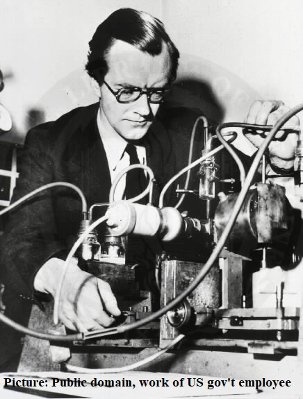
Public Domain photo: US gov't
As I read through the obituaries of the various personalities in this story, different versions of the events were presented. However, one element was unavoidable, at least in the bios of several: the urge to get credit, to be first, was a prime motivation.
Here's the broad outline of events: Wilkins was a researcher at Kings College, where he worked at perfecting x-ray diffraction in the hope of unraveling the mystery of DNA. During Wilkins' tenure, Franklin was taken on to work in the same area of research. Gosling, a PhD student, was assigned to be Franklin's assistant. Together, Franklin and Gosling, using x-ray crystallography, captured a clear, long--sought image of DNA--the historic Photo 51. This image revealed, indisputably, the double-helix structure. It was actually Gosling who took the picture.
Rosalind Franklin
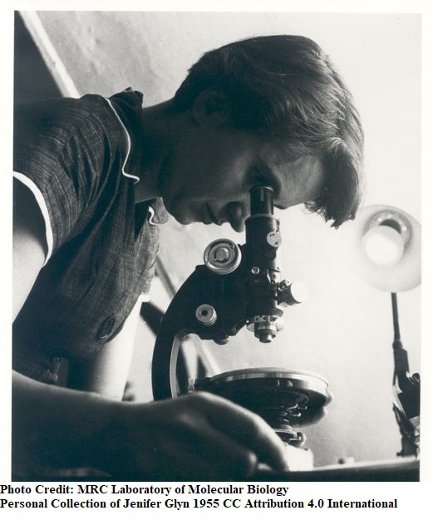
MRC Laboratory of Molecular Biology: CC 4.0 International license
This very important photo came into Wilkins' possession. He recognized its significance. Without telling Franklin or Gosling (this part is undisputed), he brought Photo 51 to Watson and Crick. This gave them the missing piece to the puzzle they had been working on. They published their findings: a description of DNA's double-helix structure. Neither Watson nor Crick attributed the photo to Franklin. Neither did Wilkins.
Watson, Crick and Wilkins eventually shared the 1962 Nobel Prize in Physiology or Medicine. None of them mentioned Franklin, or Gosling. Not until Watson published his memoir, The Double Helix did Rosalind Franklin become known to the public. And that only happened because Watson's portrayal of her in his book was so mean-spirited that it drew criticism from colleagues, including Crick and Wilkins. As a matter of fact, there were such strong objections to the book that Harvard University Press, which had originally agreed to publish, declined.
After the role of Franklin, and to a lesser extent, Gosling, became known, a London stage play and TV series were created based on the story.
Raymond Gosling, in His Later Years
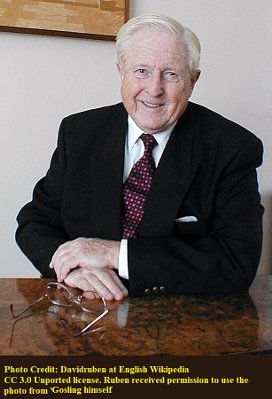
David Ruben, CC 3.0 Unported license
Raymond Gosling went on to have a distinguished career in medicine and was credited with making significant contributions to the field of diagnostic radiology.
While the outline of events surrounding Photo 51 seem clear, the story gets ambiguous in parts. Where does an idea originate? Who has the right to the results of research? Was it Wilkins' ideas and research that enabled Franklin to take Photo 51? Were earlier photos that he took progenitors of Franklin's photo? Was Wilkins entitled to Franklin's photo because he had been working in the same research facility on the same technology (radioactive crystallography) that gave rise to it?
There's another piece to this drama that adds to puzzlement over Watson's role.
It turns out that Watson had attended a lecture given by Franklin, at which she described her work and her interpretation of the images she had captured. Later on, Watson said he hadn't paid attention during the lecture.
James Watson
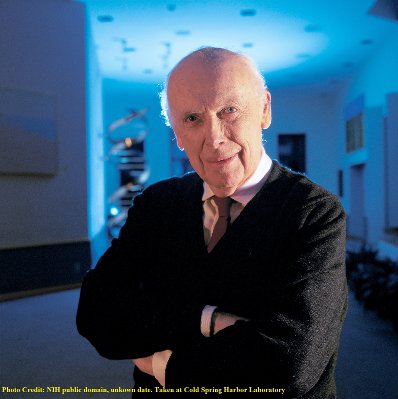
National Institutes of Health Photo: public domain
While he has been the target of much criticism in his life, not only for the Franklin affair but also for charges of racism, he has also been willing to stand on principle. While at Cold Spring Harbor (NY, USA) he resisted the policy of patenting the human genome. He believed that the human genome belonged to the people of the world, and not to nations. He lost his post at the laboratory over this issue.
Science as a Collaborative Discipline and the Issue of Priority
Throughout history, the urge to be first has spurred research. This was true when the Curies were investigating radioactivity. It was a time of great excitement and activity in science. Within the span of a few years, Roentgen, Becquerel and the Curies all investigated and worked on the mystery of radiation. They learned from each other's work and each strove to be the first to make a breakthrough. Ultimately, the Curies ended up sharing their 1903 Nobel Prize in physics with Becquerel.
Priority
In what is considered a classic paper on priority Robert Merton analyzes the sociology of science. Merton states that "Science, with its emphasis on originality, and its assigning of large awards for originality, makes recognition of priority uppermost." He explains that, unlike in other areas of ownership, once a scientist has shared knowledge, the scientist no longer owns it, so that "property rights get whittled down to just one thing: recognition." Merton concludes that because a scientist's only property rights, in the end, are focused on this one reward, recognition, the importance of priority becomes paramount, and even distorted.
Galileo
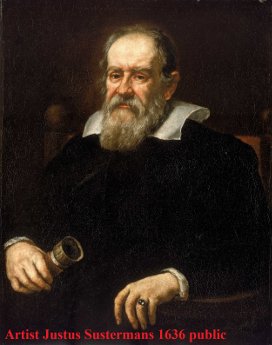
Public domain: 1640
A famous argument over priority arose between Galileo and a Jesuit priest, Christoph Scheiner. Each claimed to have been the first to discover sun spots. Some historians believe this dispute added to Galileo's difficulties with the Catholic Church.
Patents, Copyrights and Open Source
Distinctions Between Science, Commercial Research and Open Source
In an era when living organisms have been patented, it's a tricky business separating science scholarship from commercial endeavors. An organization, the IEEE tries to do just that. In a paper entitled, "Patents and Scientific Papers: Quite Different Concepts", the IEEE describes scholarship that leads to copyright and trademark as being motivated by a desire to conceal, whereas pure science scholarship strives to explain everything clearly. Another distinction the organization makes is this: patent and copyright endeavors tend to be "greedy", while pure science endeavors tend to be "generous". If we think about the many battles throughout history over priority, we might view these distinctions as not exactly precise.
A less ambiguous distinction might be found between the open source movement, and the other two areas of endeavor. Open source authors seek neither priority nor compensation. Their contributions are often anonymous. For example, all the blogs I write for Steemit, are drafted in an open source program, Open Office. I've no idea to whom I owe a debt for this great service. And, when I format pictures, I use GIMP, another open source program. My benefactors, once again, are unknown to me. Open source culture not only allows me to research and function without cost, but it also allows me to share what I discover.
According to opensource.com, the open source movement began at MIT in the 1970s when a programmer, Richard Stallman, found he did not have access to essential software to fix a malfunctioning printer. The open source culture is motivated by intellectual growth and sharing.
Conclusion
As I write this I think of Utopian-io, our open source community here on Steemit. Because I love the open source philosophy, I regret that I don't code. However I do produce content. I know that @chappertron creates illustrations that he offers copyright free, to anyone who wishes to use them. I don't draw. I do have a book available on Amazon, that I wrote years ago. It's not open source, but it is freely available as a download to anyone who wants it. Many have taken advantage of this offer. For today, I offer this blog, free of copyright, to anyone who wants to use any part of it. After all, I get so much from open source, it only seems fair.

Please Note: all images are either in the public domain or are CC licensed. The label for each is on th photo itself, and also added underneath. Can't be too careful :)
Obituaries (As of this writing, James Watson is still alive)
Maurice Wilkins
https://www.nature.com/articles/431922a
Francis Crick
https://www.nytimes.com/2004/07/30/us/francis-crick-co-discoverer-of-dna-dies-at-
Raymond Gosling
htmlhttps://www.telegraph.co.uk/news/obituaries/11624246/Professor-Raymond-Gosling-DNA-scientist-obituary.html
Rosalind Franklin
https://www.nature.com/articles/182154a0.pdf
Some Other Sources Used in Writing this Blog
https://www.americanscientist.org/article/on-the-shoulders-of-giants
https://www.iep.utm.edu/democrit/
https://plato.stanford.edu/entries/democritus
https://www.britannica.com/biography/John-Dalton/Atomic-theory
https://www.sciencehistory.org/distillations/magazine/the-lingering-heat-over-pasteurized-milk
https://www.the-scientist.com/foundations/the-rabies-vaccine-backstory-33441
http://www.strevens.org/research/scistruc/prioritas.shtml
http://blog.wellcomelibrary.org/2015/09/the-story-of-photograph-51/)
https://www.theguardian.com/science/2012/jan/20/double-helix-james-watson-review
https://wellcome.ac.uk/press-release/francis-cricks-controversial-archive-first-public-display
https://www.hollywoodreporter.com/review/nicole-kidman-photograph-51-theater-823204
https://www.pbs.org/wgbh/nova/photo51/
http://www.dnaftb.org/19/bio-3.html
https://www.nytimes.com/1993/03/21/nyregion/watson-relinquishes-major-role-at-lab.html
https://www.jstor.org/stable/2089193?read-now=1&seq=25#page_scan_tab_contents
https://www2.hao.ucar.edu/Education/FamousSolarPhysicists/christoph-scheiner
http://www.lawinfowire.com/articleinfo/patents-living-organisms
https://www.ieee.org/about/index.html
https://pulse.embs.org/january-2017/patents-and-scientific-papers-quite-different-concepts/
https://opensource.com/article/18/2/pivotal-moments-history-open-source
Very nice of Dalton to call the atom by its ancient name (though it turned out not to be indivisible!)
I like Merton's sociological analysis. I often thought about recognition being the only currency in a possible future economy where money wasn't really a factor, and whether that would work. I thought about open source as a possible real-life example of that, but I never thought of science proper.
Check this out. Very famous priority story.
I have an old post on Rosalind Franklin that I bet you'll enjoy! It's very pro-woman, unlike the stuff I write now 😅
What's the link to your book?!
Downvoting a post can decrease pending rewards and make it less visible. Common reasons:
Submit
So nice to see you here! I resisted handling the Rosalind Franklin story with a feminist slant, although the notes of the men involved demonstrate a certain misogyny. This story was so stark that feminism would just cloud the issue--it's a flashpoint for a lot of people.
There was a time I read a lot of Utopian stuff (not Utopian-io, but the classical Utopians). If only...
I appreciated Merton's discussion. There were other papers I read on the subject, but a blog can only be so long :)
As for my book....
It's kind of personal, and yet objective. I'm not sure I want you to know that much about me :) but here it is: A Lupus Handbook: These Are the Faces of Lupus
I see you have a new blog up...heading over there tonight.
Downvoting a post can decrease pending rewards and make it less visible. Common reasons:
Submit
Yeah I know what you mean, about revealing too much. I'm like that myself.
Well I inherited my dad's autoimmune disease as well, so we have something in common there! It was very confusing at first. You know, till you figure out that you need to become an active patient instead of relying on doctors. I've been using exercise and, more importantly, diet to treat myself. (My rheumatologist never even mentioned diet, and he's one of the most highly credentialed in Cyprus.) With the help of those two things and plenty of self-learning, I've been slowly but steadily dropping my pill dose ever since I was diagnosed a decade or so ago. I hit a plateau about a year ago, but glad to say I surpassed it 2 weeks ago! Might be all the fish I'm eating. Dunno if it's the omega 3s (that seems to be in doubt by the new research) or the fact that they're caught wild and frozen on the spot. In that sense, fish is probably the most authentic food (hasn't changed a lot in the last 100,000 years! unlike almost all our other meat and vegetables and fruits which were all changed by human hands) as well as quite cheap, especially if you're eating the smaller fish (which is good mercury-wise). The average person can't really hunt live animals, and they wouldn't want to either. But wild fish is available for all. I'm also following a low fodmap diet, which could also be responsible for the plateau-overcoming.
Well, I'll be reading your book. And you have quite a lot of them I see!
Downvoting a post can decrease pending rewards and make it less visible. Common reasons:
Submit
I went through a book-writing phase... I think it's over :)
After a while, after a certain age (I'm at that age), you just kind of take it in stride. Make the accommodations necessary, keep a trustworthy doctor in reserve, and enjoy life. I wrote that book when I was in a different frame of mind. Had to get it out of my system. Also thought I could help a few people. I think I did.
You're right to take matters in your own hands. We can't choose our genes, but we sure can choose the way we live.
I read you blog... I will be commenting, you know :)
Downvoting a post can decrease pending rewards and make it less visible. Common reasons:
Submit
Oh very nice lecture! I didn't know the story behind the DNA discovery.
I have always troubles with such stories because I am personally trying to be always honest in my research, citing all appropriate works and giving credits where needed. It is hard to conceive that anyone calling himself/herself a scientists would behave differently. Of course, this is before money, fame, etc. come into the game...
Downvoting a post can decrease pending rewards and make it less visible. Common reasons:
Submit
Scientist, or scholar in any field...hard to imagine working that hard at something you love and then tarnishing it with intellectual theft.
Thanks for stopping by. I really appreciate your kind comments...cheers me up :)
Downvoting a post can decrease pending rewards and make it less visible. Common reasons:
Submit
However, cases like that still happen way too much :(
Downvoting a post can decrease pending rewards and make it less visible. Common reasons:
Submit
Wow! I didn't know of these cases. At our university there is also a professor notorious for asking people's thesis, suggesting a few changes and then requesting that his name gets added to the list of Authors. The man has hundreds of articles on his name because of this.
Overall I like the academic system but I do think there is still something wrong with the way researchers are 'ranked'. The framework that is currently present truly enforces a system where people are eager to take credit wherever they can. Not at all do I understand in depth how this works but the paper you mention by Robert K. Merton explains this very fascinating indeed. Since recognition is the only thing left to gain after the research is published, the struggle exists.
Utopian-io is an interesting answer to this problem. Open source software can also has similar issues where recognition is the only thing to gain, but by providing a second possible reward besides recognition, a framework can be created that is less focused on recognition. Perhaps similar systems could be designed for the academic world?
Downvoting a post can decrease pending rewards and make it less visible. Common reasons:
Submit
For this to happen, you need to develop a personality who is confident of their insights and who doesn't care that their own name is recognized as long as the idea or insight has been unleashed. Some have gone down in the annals without any naming or accentuation of his achievement, forgotten his grave, died his name. And yet he has left a rich legacy. Difficult in an environment as competitive as ours. But not impossible. Through the many open source projects there is a breath of air that makes you happy. If you don't want to earn money and become famous, if the driving force is inspiration, but the mother of all children, you may succeed in what we want to achieve as a community. The material reward is then often only a side effect that one welcomes. True genius, in my opinion, always prevails. Either in life or afterwards. No matter whether for only one or one million people.
Downvoting a post can decrease pending rewards and make it less visible. Common reasons:
Submit
I actually got inspired about your earlier post (about consensus) for the middle part. You explained nicely 'The Journey to Jerusalem' and how the context of the game forces players into a certain behavior. I believe this is applicable here as well where the academic 'game' forces players into a position where they fight for recognition. I also believe there are genius players who refuse to let this take the upper hand, but although true genius always prevails, there are many stories in history where the legacy of a genius is credited to the wrong person.
And I awe at people who put aside these personal rewards and take satisfaction in the spreading of inspiration and knowledge rather than reputation and wealth, but I'm not sure if they would appreciate there efforts being credited to someone else.
But what you mention is definitely true and open source is something worth appreciating and promoting.
Downvoting a post can decrease pending rewards and make it less visible. Common reasons:
Submit
Glad to hear about the inspiration :)
Sure it is what you say. Someone who has contributed something essential to the gaining of knowledge with his work over the years and then sees another name taking possession of this knowledge will not appreciate it, but will probably be angry about it. The greater the frustration, the more dependent a person is on his work and the stronger his identification with his work fills his entire living space. If financial dependence is added, it is almost guaranteed that plagiarism and authorship will become the cause of conflicts. The question can only be looked at in retrospect: Has the researcher had a considerable income in his work? Could he make a living from the fruits of his labour, rent an apartment or a house, buy his food, feed a family? If so, plagiarism is still an affront. But not a life-threatening one. Only a threat to the ego. Scientists who are really interested in discovering something new, in serving people will be interested in working together and sharing their findings with others in order to contribute to the big picture. Those who meet like-minded people who see more value in cooperation than in competition will be able to achieve more in this day and age, since the time of individual thinkers seems to be over, as it was in the Renaissance and before.
Most interesting is probably the type of research that requires little financial funding. Or research that does not promise the direct application of research results, i.e. where financial profit is rather low. Still, I am hoping for a change in the long run. I think in general I am going to have trust into humans.
Also, people should make it technically easy to give credit to their works or arts just by serving an inserting text and link to their sites. If crediting is done by just one click it's more easy to do it. I see a shift here, too.
Downvoting a post can decrease pending rewards and make it less visible. Common reasons:
Submit
I was lucky when I went to college (undergraduate). Ambition was out of style. It was the late sixties (yeah, I'm really old). NYU, an open air of rebellion against all "establishment' ideas. I caught the disease :) I think that's why I was able to walk away from a degree later on. And that's why Utopian-io feels so right to me.
The story about Rosalind Franklin is horrifying. On the other hand, the world outside is pretty grasping, also. When you have to earn a living you make compromises. Maybe academic life is not perfect, but if you get to work at what you love, it's probably worth the unpleasantness.
So glad you stopped by Samve. Thank you :)
Downvoting a post can decrease pending rewards and make it less visible. Common reasons:
Submit
That was like reading a very good story. I felt drawn into the academic circles, where it is like a race for novelty. That is a great driving force of man. To discover something completely new. To be the first. To enter the history books by name. I think each of these famous personalities has their ideas from other, less named and well-known personalities, even from some of whom they are not even aware of. The concealment of inspiration, knowingly and deliberately, testifies to small-mindedness, that is sad when a scientist is guilty of it. My niece, who has been in scientific circles - at the moment she is on parental leave - said that anyone who does not publish has no meaning. And so one must probably publish something and always be involved in some exciting research in this day and age. I wonder if this publication pressure doesn't have the exact opposite effect and doesn't simply inflate a lot of secondary stuff.
But in the back rooms and alongside the mainstream of established and recognized sciences, there are still the minorities who, as always, are more likely to endure shame and disgrace because they oppose something set and established with their crazy theses and ideas. Actually, it is not much different from the times when the Church was the opponent of science. Today it is their own ranks. So it is probably similar to scientific blasphemy to question the laws of nature and say: Couldn't it be habits instead of laws? Only the really disturbing, unsettling and annoying statements of new thinkers and inquisitive people brought the paradigms to change. Such things cannot always be observed in a single human life and take time.
But I have digressed. You have written a brilliant article which I found very revealing.
I would have asked you for the link as well and now Alexander has already done so.
And you are right about open source. I think it's actually a compliment if someone is using a phrase or a personal story of mine and shares it. Also, you go incognito here which is another indication of sharing your contents. Of course, the discussion about ownership never will end once you put all your finances and resources in and other people make a winning of your work. I have no answer to that. Just decide on my own how to handle it.
Downvoting a post can decrease pending rewards and make it less visible. Common reasons:
Submit
Thank you, Erika, for that generous appraisal. Competing is something I'm not good at. My ego is quite tender, but I'm so empathetic that I always feel for the loser in a game. No fun playing with me, ever.
As I explained to @samve, my coming of age occurred in the late '60s. There was a sense of fatigue over the materialistic 50s. Vietnam War was going strong. Then the government response to protests was so strong-armed. This experience helped to mold my attitude toward money and social justice.
This blog was a natural for me. Rosalind Franklin was treated so shabbily. The records of the men who won the Nobel Prize I think are stained forever by this legacy. And the idea of priority, that it is a defined idea in science--that was new to me. Just reading about Darwin last night and he refers to priority. I guess among scientists this is a common term.
I love it here, on Steemit, because I get feedback like yours. Everything else is a bonus.
Downvoting a post can decrease pending rewards and make it less visible. Common reasons:
Submit
Oh, I feel the same! Always holding thumbs for the underdogs. I hate competition when there is a "loser" or a "loser team". Why should anyone suffer from work or games?
Governments must perceive the people as intelligent and sensible. If the folks behave unintelligent, impulsive and stupid they must not wonder that the governmental institutions look down on them. That doesn't sound nice but has some truth. On the other side, peaceful protesters should be treated with respect.
Yeah, some characters were treated really shabby, that is also true. A lot of mistreatment and misinformation comes to light after some time, though. I guess it was a lesson good for something for those who suffered from this.
This platform is so much better than any other I so far encountered. It creates better bondage and co-working compared to single blogs or facebook & Co.
Downvoting a post can decrease pending rewards and make it less visible. Common reasons:
Submit
Defining events of my time: Kent State, assassination of Martin Luther King and the Vietnam War. There were more, but those stand out. Not history for me, but part of my experience. Wonderful to exchange ideas with you, friend.
Downvoting a post can decrease pending rewards and make it less visible. Common reasons:
Submit
This post has been voted on by the SteemSTEM curation team and voting trail in collaboration with @curie.
If you appreciate the work we are doing then consider voting both projects for witness by selecting stem.witness and curie!
For additional information please join us on the SteemSTEM discord and to get to know the rest of the community!
Downvoting a post can decrease pending rewards and make it less visible. Common reasons:
Submit
Thank you!
Downvoting a post can decrease pending rewards and make it less visible. Common reasons:
Submit
This story never gets old. Rosalind Franklin is one of my favorite scientists and it's still a shame she hasn't been officially recognized for this work.
Fortunately, the drama around the incident has highlighted her efforts and public opinion is well in her favor these days.
A few extra tidbits to add to this story:
I visited Cold Spring Harbor for a conference a few years ago. Watson had been a major fixture there for a long time (I'm talking statues dedicated to him), but his presence there had been significantly diminished due to his racist comments. Plaques were removed and statues hidden to get his name away from the institute. At this point, CSHL has completely severed ties with Watson and tries to distance itself away from him as much as possible.
Rosalind Franklin did make some significant scientific contributions to science after taking that photo. If I remember correctly, she studied the structure of virus envelopes and earned some fame in the science world from that work. Unfortunately, she died early from cancer which may have been caused by her extensive work with X-rays.
Downvoting a post can decrease pending rewards and make it less visible. Common reasons:
Submit
I began this blog because of Rosalind Franklin. I was stunned by the shenanigans of her colleagues. Everything I've read about her that's been published since her death extols her unique brilliance. She did have a distinguished career before and after the DNA drama. Imagine if she had lived? Her death, though, allowed those Nobel Laureates to get away with their disgraceful behavior. Watson and Crick. We all know their names.
What I find interesting about Watson and Cold Spring Harbor Laboratory is the irony of someone accused of racism finding (temporarily, at least) a home there. Cold Spring Harbor has a notorious history as a eugenics laboratory. I live pretty close to the facility and was amazed when I first read about the role of the laboratory in the eugenics movement.
As I was doing research for this blog I came across Rosalind Franklin's papers at Wellcome Trust. I thought of writing a book--but that book has been written, many times :)
Thanks for your comments. Really gratifying to see you stopping at my blog.
Downvoting a post can decrease pending rewards and make it less visible. Common reasons:
Submit
Well you wrote a great article so you deserve all the attention you can get. I didn't know about CSHL's eugenics history. I'll have to keep that in mind if I ever go back there.
Downvoting a post can decrease pending rewards and make it less visible. Common reasons:
Submit
Thank you!
Downvoting a post can decrease pending rewards and make it less visible. Common reasons:
Submit
This is excellent research, well deserving of the Curie vote. I learned a lot. But as far as academics go to ensure there is less competition and more cooperation, there is human nature. People want to be recognized, and they want the rewards for making discoveries. I doubt that will ever change.
Downvoting a post can decrease pending rewards and make it less visible. Common reasons:
Submit
Thank you! My husband and I have a deal. I write the best blog I can. Then it's out of my hands. It's nice, though, when other Steemians appreciate my efforts.
Downvoting a post can decrease pending rewards and make it less visible. Common reasons:
Submit
You have a great relationship, you and your husband. :-)
Downvoting a post can decrease pending rewards and make it less visible. Common reasons:
Submit
46 years on April 30. Finally, we know what we've got :)
Downvoting a post can decrease pending rewards and make it less visible. Common reasons:
Submit
Ha ha. Yeah, it takes a while. I'm glad you found it.
Downvoting a post can decrease pending rewards and make it less visible. Common reasons:
Submit
Hey @agmoore,
thank you for this marvelous article again. I'm hoíghly interested in the history of science and the persons behind. Especially in the case of Franklin vs. Watson, Crick & Co., it is a real shame. In a later book of both (W&G), they just mentioned her besides in a bit derogatory manner as "Rosi". In fact, she was the genius mind making all this possible. Unfortunately, she died of ovarian cancer later one. That's the real drama.
The next drama is that science is often too much "fishing for fame" than improving mankind.
About the pictures: Are they all copyright free? Can you write it under them to make sure there is no copyright violation? It's important for @steemstem if you want to become upvoted.
Have a nice weekend
Regards
Chapper
Downvoting a post can decrease pending rewards and make it less visible. Common reasons:
Submit
I was just getting ready to turn in when I saw your comment. You made me happy :) Thanks a lot.
The photos are all labeled, but perhaps the labels are too small. So I took your advice and went back to add a note at the bottom of each. Also, at the end of the blog, I have added a note indicating that the pictures are labeled. Whew!
I was also very moved by the Photo 51 story. Disgraceful. I don't know how those Nobel Laureates could face the public after the story became known.
My training (undergraduate) is in history, so I eat this stuff up. So glad there are other people who enjoy the material.
You have a great weekend and thanks again for the advice.
Peace, always,
AG
Downvoting a post can decrease pending rewards and make it less visible. Common reasons:
Submit
Another interesting story is the discovery of DNA by Friedrich Miescher.
Maybe I will write something about this one day, if you are not faster ;-).
Downvoting a post can decrease pending rewards and make it less visible. Common reasons:
Submit
😅
I look forward to reading it...my racing days are long over :)
Downvoting a post can decrease pending rewards and make it less visible. Common reasons:
Submit
Photo 51 is really awesome work.
Franklin was one of the 20-century geniuses in my eyes.
Have a nice weekend
Beste
Chapper
Downvoting a post can decrease pending rewards and make it less visible. Common reasons:
Submit
Have a great weekend. I'm off to do some artwork for @shaka.
Peace, AG
Downvoting a post can decrease pending rewards and make it less visible. Common reasons:
Submit
U2! And good luck with the artwork ;-)
Cheers
Chapper
Downvoting a post can decrease pending rewards and make it less visible. Common reasons:
Submit